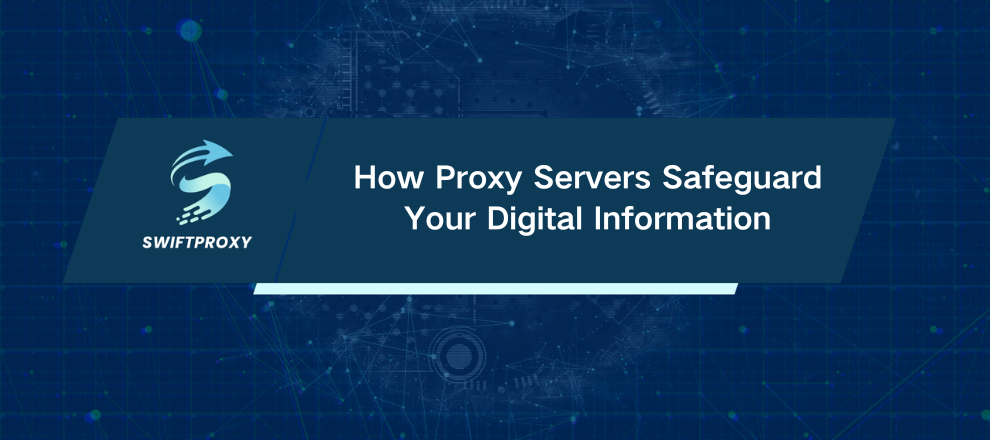How Proxy Servers Safeguard Your Digital Information

Every click, every connection online leaves a trace. From location tracking to behavioral profiling, your digital footprint can be far more revealing than you think. Proxy servers offer a shield—an intelligent, flexible tool to protect your data while managing network traffic efficiently.
In this guide, we'll break down the security advantages of proxy servers, show you how they function, and reveal the scenarios where they shine. By the end, you'll know how to choose a trustworthy solution and understand the factors that make a proxy reliable.
Understanding Proxy in Cybersecurity
Think of a proxy as a gatekeeper between you and the internet. Instead of connecting directly to a website, your request goes through a middleman—a proxy server. The site only sees the server's IP address, not yours. Your location, your identity, your metadata—they remain hidden.
Beyond anonymity, proxies manage traffic intelligently. They enforce custom access rules, control downloads, block risky content, and monitor network activity. For IT teams, they are invaluable for creating a controlled, responsive environment where every request is filtered, logged, and analyzed for potential threats.
Key Advantages of Secure Proxy Servers
Implementing a proxy server can transform your cybersecurity strategy. Here's what it delivers:
Hide your IP: Makes physical location untraceable and reduces the risk of targeted attacks.
Protect metadata: Keeps trackers and advertisers in check while enhancing privacy.
Filter threats: Blocks phishing sites, malware, and malicious downloads before they reach users.
Boost performance: Speeds up access to frequently visited pages and lowers bandwidth costs—vital for large organizations.
Granular access control: Different permissions for users depending on their roles or needs.
When combined with firewalls, VPNs, and antivirus software, proxies create a multi-layered defense that keeps you one step ahead of cyber threats.
What Ensures a Proxy Server Is Truly Secure
Not all proxies are created equal. A secure proxy isn't just a middleman—it's a robust tool. Paid, dedicated proxies offer private, static IPs with zero logging and stable, redundant infrastructure. Free options? They come with hidden risks:
Altered content on the fly. You might get served material you didn't request.
Shared IPs can get banned due to others' misbehavior.
Data collection and resale to third parties.
No support during downtime or connectivity issues.
Free proxies are never a reliable cybersecurity solution.
Choosing a Trusted Proxy Provider
Your provider isn't just a technical vendor—they're a critical link in your cybersecurity chain. Look for:
Strict no-logs policy: Reputable providers do not record user activity.
Secure protocols: HTTPS and SOCKS5 support ensures encrypted connections.
24/7 support: Instant assistance prevents downtime from compromising security.
Flexible authentication: Options include IP-based access, tokens, or username/password combinations.
IP rotation: Essential for bypassing blocks and maintaining anonymity.
User-friendly dashboards: Clean interfaces with automated invoicing save time.
Global coverage: Multiple IP types and locations support advanced use cases like scraping, QA testing, and geo-targeted operations.
Always verify the provider's legal status, Terms of Service, and data policies.
How Hackers Exploit Proxy Servers
Proxies are double-edged. While they protect, they can also mask malicious activity:
Hide attackers' real IPs.
Distribute traffic through botnets for DDoS or brute-force attacks.
Bypass email filters for phishing campaigns.
Evade geo-restrictions on protected networks.
Understanding these tactics helps IT teams deploy defenses like IP monitoring, traffic pattern analysis, and ethical penetration testing.
When and How to Use Proxies
Proxies shine in situations where security and privacy are critical:
Public Wi-Fi: Cafes, airports, or shopping centers—protect connections and filter suspicious traffic.
Corporate networks: Integrate proxies with DLP systems, firewalls, and antivirus solutions for enterprise-grade security.
Parental control: Filter harmful websites and supervise children's browsing.
Sensitive communications: Journalists, financiers, and human rights advocates can safeguard data and anonymity.
Best practices:
Avoid free, unverified proxies.
Configure settings only via trusted software or official extensions.
Keep filtering rules current to block malware effectively.
Combine with antivirus programs, firewalls, and VPNs for layered security.
Enable connection logging for monitoring suspicious activity.
Final Thoughts
A proxy server does more than mask your IP address; it manages traffic, enforces access controls, blocks malicious domains, and maintains anonymity. When combined with firewalls, antivirus programs, and SIEM systems, proxies become a key component of a multi-layered cybersecurity strategy suitable for both individuals and enterprises. With careful deployment, proxies not only provide protection but also enhance control and efficiency across networks.

















































